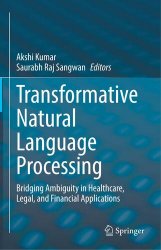 Название: Transformative Natural Language Processing: Bridging Ambiguity in Healthcare, Legal, and Financial Applications Название: Transformative Natural Language Processing: Bridging Ambiguity in Healthcare, Legal, and Financial Applications
Автор: Akshi Kumar, Saurabh Raj Sangwan
Издательство: Springer
Год: 2025
Страниц: 247
Язык: английский
Формат: pdf (true)
Размер: 10.1 MB
The evolving landscape of technology has presented numerous opportunities for addressing some of the most critical challenges in high-stakes domains such as medicine, law, and finance. These fields, where the stakes are exceptionally high, have increasingly turned to Natural Language Processing (NLP) to manage, interpret, and utilize vast amounts of unstructured linguistic data. The complexities and subtleties inherent in human language pose significant challenges in these sectors, where precision and clarity are paramount. Misinterpretation or ambiguity can lead to far-reaching consequences, making the need for advanced NLP techniques crucial.
This book aims to bridge the gap between state-of-the-art NLP technologies and their practical applications in medicine, law, and finance. By focusing on the specific challenges and advancements within these sectors, the publication intends to highlight innovative approaches, methodologies, and technologies that are shaping the future of NLP. It discusses the integration of NLP with other technological advancements, the development of new tools and techniques, and the ethical considerations involved in deploying NLP solutions in high-stakes domains.
Moreover, the book provides a platform for researchers, practitioners, and industry experts to share their experiences, insights, and research findings. Through comprehensive reviews, case studies, and empirical research, it covers a range of topics including but not limited to handling uncertainty in clinical notes, approaches for dealing with ambiguity in legal documents, sentiment analysis in financial markets, and ethical considerations in the use of NLP for sensitive data.
Deep Learning, a sophisticated branch of Machine Learning, leverages multi-layered artificial neural networks to extract intricate features from data. These models, excelling in various NLP tasks, including sentiment analysis, have shown remarkable capabilities in capturing complex relationships within text.
The emergence of Large Language Models (LLMs) is revolutionizing the way this evidence is managed and analyzed. LLMs, trained on massive text and code datasets, possess the remarkable ability to not only comprehend human language but also to discern patterns, extract key information, and even generate summaries from various data formats. In the context of legal proceedings, this translates to a powerful capability for automating the review and analysis of evidence, freeing up legal professionals to focus on more strategic tasks. For instance, LLMs can analyze audio recordings of depositions or interrogations, transcribing the speech and identifying key statements or contradictions that may be relevant to a case. Similarly, LLMs can sift through troves of emails and text messages, extracting relevant conversations, identifying key individuals, and flagging potentially incriminating or exculpatory information. This automated analysis can significantly expedite the evidence review process, enabling legal teams to build stronger cases and make more informed decisions.
Several open-source and commercial NLP toolkits specifically designed for legal text processing have emerged, such as LegalNLP, PyMuPDF, and SpaCy’s legal extension. These toolkits provide pretrained models, annotation tools, and specialized functionalities for tasks like NER, relation extraction, and legal text classification, facilitating the development of legal NLP applications. For instance, LegalNLP, a Python library, offers pre-trained models for legal NER, relation extraction, and document similarity analysis, enabling developers to quickly build legal NLP applications without starting from scratch. This can be particularly useful for tasks such as identifying legal entities in contracts or determining the similarity between two legal documents. PyMuPDF, another Python library, provides tools for extracting text and metadata from PDF documents, which are commonly used in the legal domain. This functionality is essential for preprocessing legal documents and making them amenable to NLP techniques.
Скачать Transformative Natural Language Processing: Bridging Ambiguity in Healthcare, Legal, and Financial Applications
|